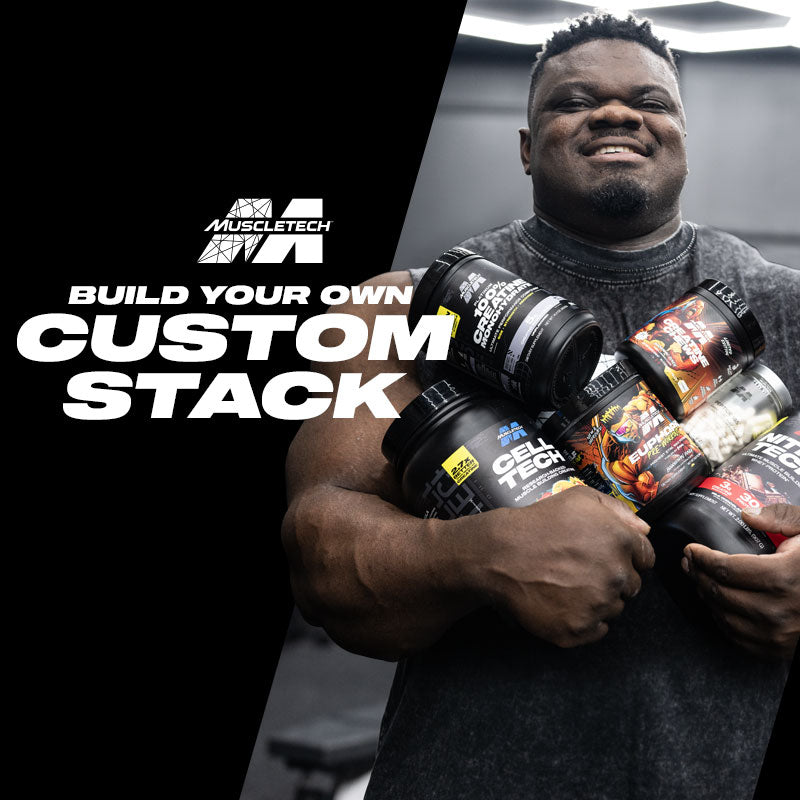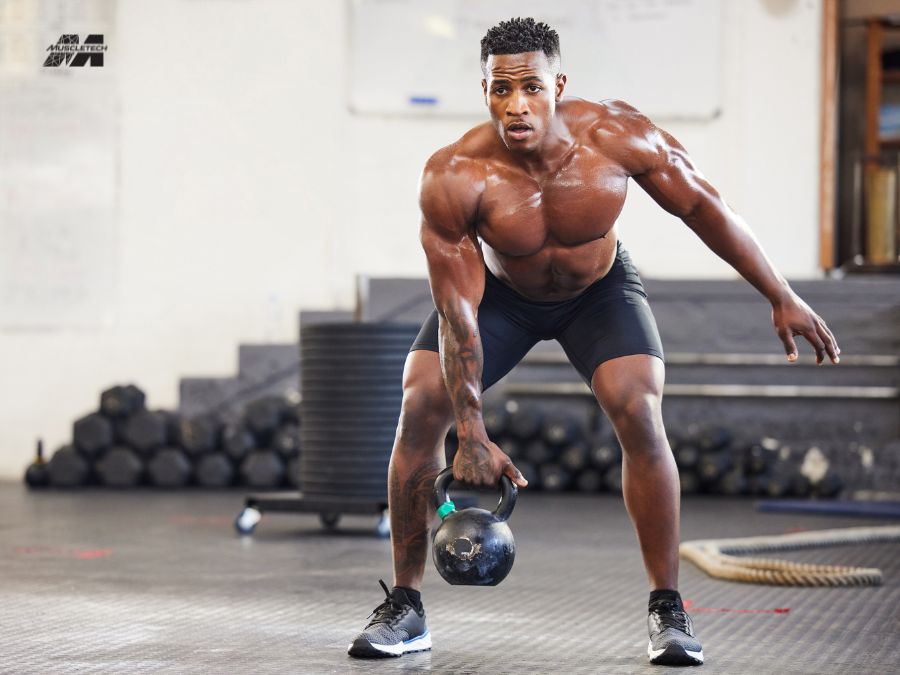If you are in the gym working on building your body and improving performance, chances are you have heard of creatine.
Creatine is one of the most widely used and researched supplements on the market and has a reputation for enhancing strength, power, and muscle mass.
Whether you are a bodybuilder, powerlifter, Olympic weightlifter or someone simply looking to get fit, creatine can help you reach your goals.
But then comes the question: Should you cycle creatine?
You may have been told that supplements like creatine should be taken for a period of time and then stopped before resuming their consumption.
With many different opinions and conflicting advice out there, it can be tough to know what is gym talk and what is evidence-based.
This article will cover what the best course of action is with regard to creatine supplementation and whether or not it should be cycled.
You'll discover what creatine does, why it's effective, and whether taking breaks from it is beneficial or necessary.
So that you can supplement effectively and reach your fitness goals faster.
Table of contents
What Is Creatine?
Creatine is a naturally occurring compound found in your body, primarily in your muscles.
But it is also found in the brain, liver, and kidneys.
Creatine plays a key role in producing energy for high-intensity movements and is derived from the amino acids glycine, arginine, and methionine. (1)
Performing activities like lifting heavy weights, springing, jumping, etc. relies on quick bursts of energy from adenosine triphosphate (ATP).
Otherwise known as the energy currency of the body.
When ATP stores are limited creatine is used for rapid regeneration of this ATP for repeated performance of intense movements. (1)
By supplementing with creatine and maximizing your creatine stores you can regenerate ATP more quickly.
This results in sustaining high-effort activities for longer and faster recovery between your efforts.
Your body can naturally produce creatine and you can consume it from a diet high in red meat and fish. (1)
But, the most effective way to top off your creatine stores is through supplementation.
What Does Science Say About Cycling Creatine?
The conversation regarding whether or not to cycle creatine often stems from “gym bro” talk rather than science.
The research on creatine supplementation cycling shows that it is unnecessary to maintain its benefits. (2)
The mechanism of creatine on performance stems from having the maximum amount in your creatine stores.
Thus, the longer you can sustain saturation of these stores with creatine the higher the impact it will have.
You also do not get less efficient at absorbing creatine with prolonged use such as with other substances like caffeine. (1)
Thus, it is best to maintain creatine supplementation for as long as you want to reap the benefits from it.
After a loading phase, the maintenance dose of 5 grams per day will accomplish this.
Cause of cycling myths
So why do these myths around the creatine cycle persist?
As mentioned above, much of the confusion comes from old-school thinking and non-evidenced-based practices.
Many lifters may also assume that creatine absorption is similar to substances like caffeine or nicotine where you need more and more of it over time to maintain its effect.
However, there is no evidence to support that cycling creatine enhances its ergogenic effect.
Cycling creatine may hinder its effect since you will effectively decrease your creatine stores when not consuming it.
This will not only reduce the amount available for ATP production but also require another loading phase to re-saturate stores.
Benefits of Continuous Creatine Supplementation
1. Increased Muscle Creatine Stores
A diet high in red meat and fish can provide more creatine for training than a vegetarian diet would.
However, supplementation is needed for maximal saturation of your creatine stores due to the amount of creatine needed to do so.
Studies show that consistently taking creatine can increase your resting creatine levels by 24.5% and creatine phosphate levels by 38.4%. (3)
This increase is what is responsible for maintaining fast energy availability during explosive movements in the gym and sports.
Continuous supplementation via a maintenance phase will ensure this reservoir never taps out when you need it.
2. Improved Exercise Performance
Whether exercise is your sport or you are using your exercise to train for sport creatine will help you perform better in the gym.
Even with just a 1% improvement in the gym day-to-day, the compounding effect can add up to massive gains over a training cycle.
One of the most documented benefits of creatine is its ability to enhance exercise performance.
Research shows that creatine supplementation can improve training performance in sprinting, weightlifting, and high-intensity training like CrossFit by up to 15%. (3)
Without continuous supplementation, these percentage increases would not be possible for parts of the year when intake stops.
Rather than cycling creatine, simply intake the maintenance dose daily and you can avoid these dips in performance.
3. Enhanced Power Output
With regards to increasing pure power output, creatine is a must in your supplement stack.
Research shows that creatine supplementation can increase peak power by 4% and mean power by 5% with repeated sprinting. (3)
So, if you train for sports like track and field, football, baseball, etc, where you need to get to point A to point B faster than your competition creatine can help.
Similarly, as creatine stores are maintained and training performance improves, your fast twitch muscle fibers increase in size and strength allowing you to enhance other power-based activities.
These include Olympic weightlifting, powerlifting, kettlebell training, etc.
4. Increased Strength and Muscle Gains
In the same light as improved power output, continuous creatine supplementation can improve your absolute strength and muscle mass.
Research consistently shows that creatine supplementation leads to an increase in maximal strength development and hypertrophy. (1)
By keeping your muscles saturated with creatine phosphate you improve your muscle's ability to perform repetitions.
With each additional repetition, more muscle damage occurs, and muscular tension increases.
This ultimately causes an increase in muscle mass as your body adapts to the increased workload.
With consistency and time, each additional repetition at higher intensities then translates to increases in maximal strength performance.
But this effect requires a long-term approach and this period of “off cycling” of creatine would negatively impact our success.
Recommendations for Creatine Supplementation
1. Loading Phase
When starting your creatine supplementation, utilize a loading phase to quickly saturate your muscles with creatine phosphate.
When starting your creatine supplementation it is best to begin with a loading phase.
Loading phases are another topic of discussion among trainees who debate whether or not they are needed.
You can saturate your creatine stores without a loading phase however it will take significantly longer to do so. (1)
With what you now know about creatine's mechanism it’s clear that the sooner you can fully saturate your muscles the better.
Thus, a loading phase is ideal.
The loading protocol typically involves taking 20g of creatine per day, for 5-7 days. (2)
Once this phase is complete you can assume that your muscles have been fully saturated and can move to a maintenance dose.
2. Maintenance Phase
Once creatine stores have been fully saturated with a loading phase you can drop your consumption to 5g per day. (1)
Ultimately the best time to take this maintenance dose is up to you and what is most consistent with your routine.
However, taking it with a post-workout shake may be best to top off the depleted stores as fast as possible.
Unlike the loading phase, the maintenance dose can be taken all at once because it is only one-quarter of the loading size.
Consistently taking this maintenance dose allows for long-term saturation of muscle tissues with creatine and the benefits mentioned above.
Performance Benefits Beyond Strength and Power
1. Improved Recovery
In addition to the strength and power benefits of creatine supplementation, it also has an impact on your recovery.
This includes decreased time for regeneration of energy between reps and sets, reduced muscle damage at a given workload, and less inflammation following intense training. (1)
Novice lifters may not put much stock into maximizing recovery but advanced lifters know that when it comes to making gains, recovery is the most important aspect of training.
When you can put in a tough training session and come back to do it again quicker and with better readiness consistently you will ultimately outpace your competition.
2. Limited Endurance Impact
Since creatine's role is primarily the replenishment of substrates involved in high-intensity and explosive actions, it does not have as big of an impact on your endurance.
For example, long-distance runners or cyclists may not see direct improvements in their ability to sustain work for several hours.
But, supplementing with creatine can be beneficial for these athletes in instances where they need a quick burst of power.
This could include a sprint to the finish, uphill climbs, or overtaking a competitor.
Theoretically, with increased leg strength from creatine supplementation, it is feasible that with each cycle or stride you improve your power and efficiency.
3. Misconceptions About Creatine Cycling
Some athletes believe in cycling creatine due to myths and outdated theories that have been passed down over time.
It’s important to use evidenced-based sources when making decisions about supplementation to not fall prey to gym folklore which ultimately impacts your performance.
4. Kidney damage
Some may question the safety of long-term creatine use however research has shown that creatine is safe for healthy individuals. (1)
A frequent concern is kidney damage with long-term intake however these concerns are often not supported in research for healthy individuals.
If you are without pre-existing conditions then research has shown continuous creatine supplementation to be effective and poses no harm when taken as directed.
5. Dependency
Another misconception is that you will become dependent on external creatine sources with continuous supplementation.
But, even if there is a temporary downregulation of cratine production this is reversed once supplementation stops with no long-term effects on your body’s natural production.
Best Option for Creatine Supplementation
MuscleTech Platinum 100% Creatine is a premium form of pure creatine monohydrate, one of the most researched supplements on the market.
It provides all the creatine you need to build muscle mass, boost strength, and enhance your performance.
Each serving contains 5g of creatine monohydrate, making it easy to achieve your loading or maintenance phase and saturate your muscles for performance.
MuscleTech Platinum 100% Creatine is trusted by athletes worldwide because of its purity, potency, and the results it provides.
If you are ready to take your performance in the gym to the next level be sure to purchase MuscleTech Platinum 100% Creatine today!
So, Should You Cycle Creatine?
As you can see, the scientific evidence supports continuous creatine supplementation over cycling.
Physiologically there is no need to stop taking it once you begin as long as you wish to optimize muscle creatine saturation and reap its benefits.
To maximize your results, begin with a loading phase for 5-7 days, then drop to a maintenance dose of 5g per day and continue on for as long as you need to.
With continuous supplementation, you’ll see enhanced strength, power, and recovery in the gym and elevate your training gains to new heights!
FAQs About Creatine Use
Can I take creatine on rest days?
Yes, taking creatine on rest days will help keep our muscles saturated with creatine for subsequent train days to ensure consistent benefits over time.
Whether you are training or resting take either your loading or maintenance dose relative to where you are in the protocol.
Is creatine safe for long-term use?
Yes, creatine is safe for long-term use for healthy individuals when taken as recommended. (1)
If you currently have a pre-existing condition or are in a sport with a governing body be sure to check with your physician and/or compliance dept prior to use.
Should I stop taking creatine if I stop training?
If you stop training for a period you can choose to stop supplementing.
But, creatine has been shown to improve brain function, injury prevention, and overall muscle function. (1)
So, depending on why you stopped training supplementation may still benefit you.
Can women use creatine?
Creatine is effective and safe for men and women.
Women can reap the same benefits from creatine such as strength, power, and recovery just as men do.
References:
Kreider, R. B., Kalman, D. S., Antonio, J., Ziegenfuss, T. N., Wildman, R., Collins, R., Candow, D. G., Kleiner, S. M., Almada, A. L., & Lopez, H. L. (2017). International Society of Sports Nutrition position stand: safety and efficacy of creatine supplementation in exercise, sport, and medicine. Journal of the International Society of Sports Nutrition, 14, 18. https://doi.org/10.1186/s12970-017-0173-z
Antonio, J., Candow, D. G., Forbes, S. C., Gualano, B., Jagim, A. R., Kreider, R. B., Rawson, E. S., Smith-Ryan, A. E., VanDusseldorp, T. A., Willoughby, D. S., & Ziegenfuss, T. N. (2021). Common questions and misconceptions about creatine supplementation: what does the scientific evidence really show?. Journal of the International Society of Sports Nutrition, 18(1), 13. https://doi.org/10.1186/s12970-021-00412-w
Antonio, J., Candow, D. G., Forbes, S. C., Gualano, B., Jagim, A. R., Kreider, R. B., Rawson, E. S., Smith-Ryan, A. E., VanDusseldorp, T. A., Willoughby, D. S., & Ziegenfuss, T. N. (2021). Common questions and misconceptions about creatine supplementation: what does the scientific evidence really show?. Journal of the International Society of Sports Nutrition, 18(1), 13. https://doi.org/10.1186/s12970-021-00412-w







